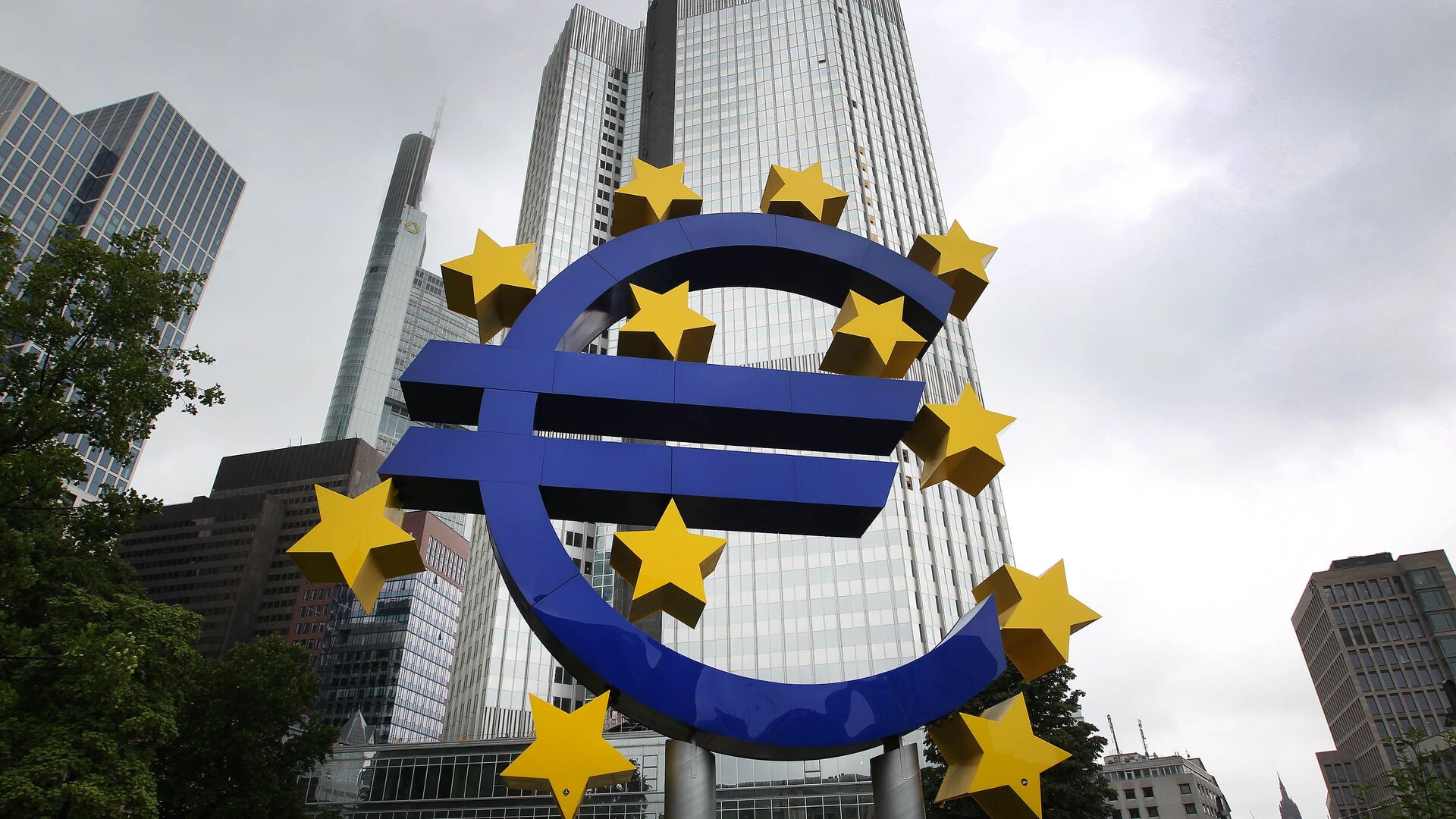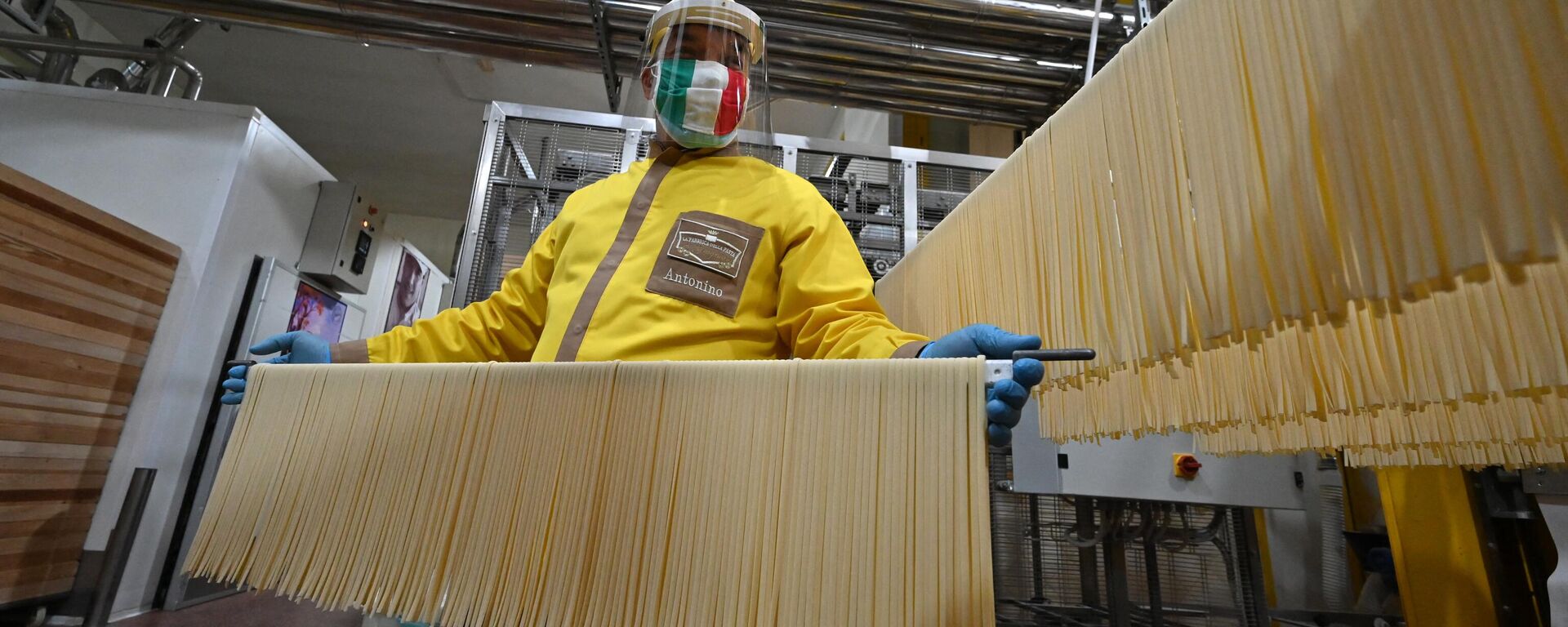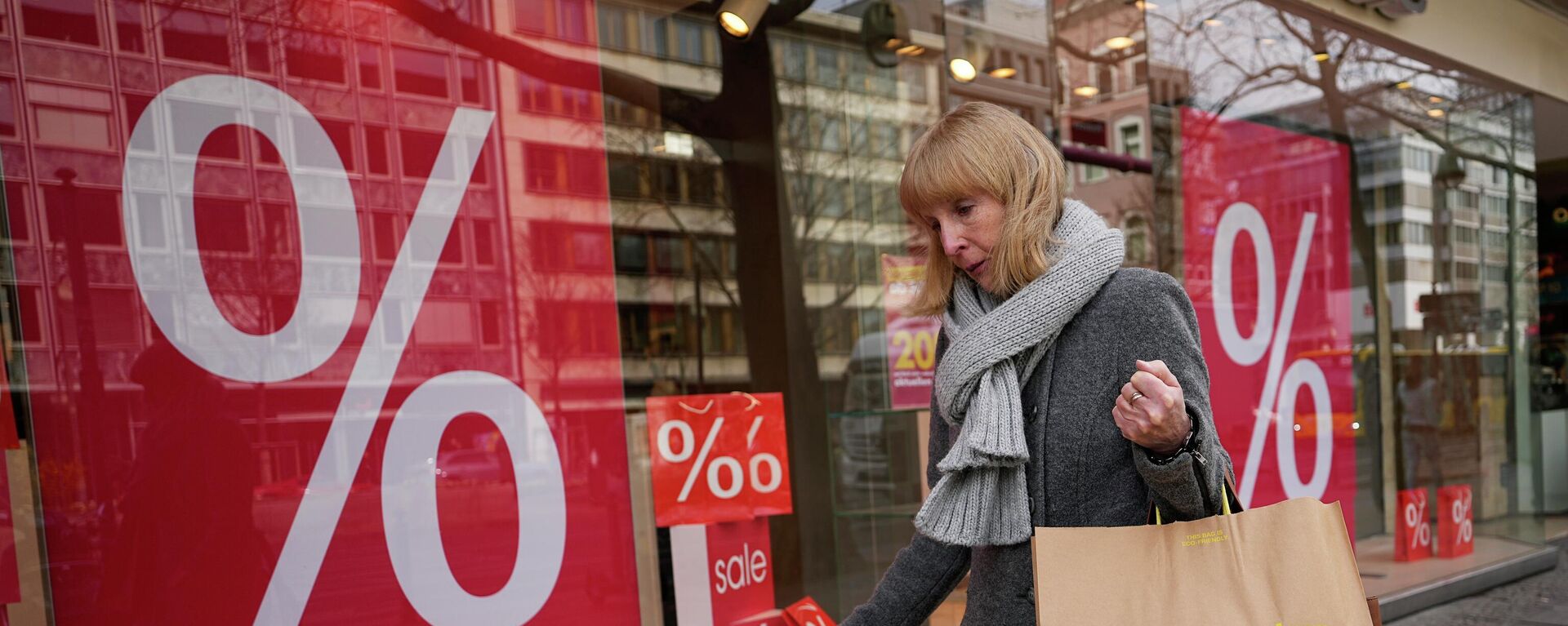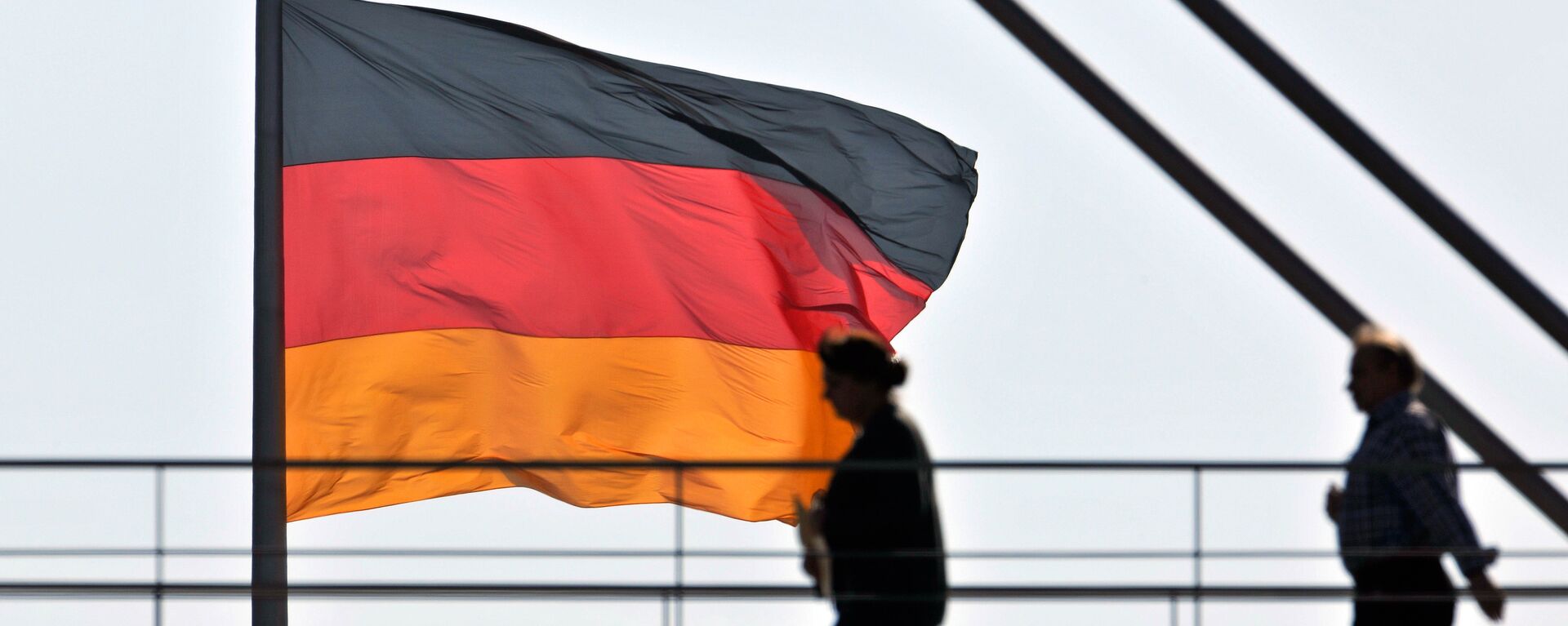https://sputnikglobe.com/20230703/italian-manufacturing-contracting-rapidly-amid-aggressive-ecb-hikes-1111639855.html
Italian Manufacturing Contracting Rapidly Amid Aggressive ECB Hikes
Italian Manufacturing Contracting Rapidly Amid Aggressive ECB Hikes
Sputnik International
Italy's manufacturing shrank in June at the fastest pace over the past three years showing signs of recession in the Eurozone, a survey indicated on Monday.
2023-07-03T12:54+0000
2023-07-03T12:54+0000
2023-07-03T12:54+0000
world
european union (eu)
europe
recession
economic recession
giorgia meloni
matteo salvini
christine lagarde
italy
rome
https://cdn1.img.sputnikglobe.com/img/102777/93/1027779359_0:182:3500:2151_1920x0_80_0_0_d7448f32da8bcc94e0866e96ba7f9518.jpg
Italian industries and manufacturing seem to be in trouble, with the HCOB Global Purchasing Managers' Index (PMI) sliding to 43.8 last month down from 45.9 in May. The indicator has been well below 50 for three consecutive months, demonstrating that the nation's industrial output is steadily shrinking.Even though the Italian economy rose by 0.6% in the first quarter, the European Central Bank's interest rate hike and the global slowdown has eventually backfired on the eurozone's third-largest economy in recent months. At the same time, however, services and employment have grown amid a boom in the nation's tourist sector. In general, the Italian government is officially projecting that the country's gross domestic product (GDP) growth will be 1.0% this year, a far cry from last year's rate of 3.7%.Meanwhile, S&P Global forecast that Italy's manufacturing slowdown will deepen as the ECB is continuing its fight against inflation. Eurozone inflation fell to 5.5% in June, while the annual inflation rate in Italy was 6.4% last month, dropping from 7.6% in May.On June 15, the ECB's Governing Council signaled that it is determined to ensure that inflation returns to its 2% medium-term target and decided to raise the three key ECB interest rates by 25 basis points.As a result of these financial maneuvers, Eurosystem staff hope to see headline inflation to average 5.1% in 2023, before it declines to 3.0% in 2024 and 2.3% in 2025. ECB President Christine Lagarde made it clear last month the financial institution's work "is not finished. Barring a material change in the outlook, we will continue to hike rates in July."The Italian premier, Giorgia Meloni, is not happy with the development given the nation's manufacturing sector slump: she lashed out at the ECB aggressive rate hikes last Wednesday while addressing the Rome Parliament. Meloni emphasized that even though it was right to fight inflation "decisively", the "simplistic recipe for rate increases undertaken by the ECB does not appear to be the most correct path."Likewise, Italy's Deputy Prime Minister Matteo Salvini called Lagarde's decision to proceed with hikes "senseless and harmful."Earlier last month, European media reported that the Eurozone slid into technical recession in the first three months of 2023, citing figures from Eurostat, the EU’s statistical agency. Per the agency, after revisions of earlier estimates, the bloc's GDP plummeted by 0.1% in the first quarter of 2023 and the final three months of 2022. Two consecutive quarters of negative growth are commonly considered to be a "technical recession."
https://sputnikglobe.com/20230505/no-shells-no-pasta-italy-faces-food-and-ammo-troubles-amid-ukrainian-crisis-1110127096.html
https://sputnikglobe.com/20230702/italian-families-cut-on-food-amid-growing-prices-1111628471.html
https://sputnikglobe.com/20230527/germanys-recession-is-eus-first-falling-domino-1110615851.html
italy
rome
Sputnik International
feedback@sputniknews.com
+74956456601
MIA „Rossiya Segodnya“
2023
News
en_EN
Sputnik International
feedback@sputniknews.com
+74956456601
MIA „Rossiya Segodnya“
Sputnik International
feedback@sputniknews.com
+74956456601
MIA „Rossiya Segodnya“
eu recession, eu inflation, economic slowdown eurozone, italy inflation, italian industries slowdown, italian manufacturing sector shrinking, italian economy, eurozone inflation, eurozone recession, european central bank, ecb president christine lagarde, ecb interest rate hikes, european central bank interest rates, european central bank inflation target
eu recession, eu inflation, economic slowdown eurozone, italy inflation, italian industries slowdown, italian manufacturing sector shrinking, italian economy, eurozone inflation, eurozone recession, european central bank, ecb president christine lagarde, ecb interest rate hikes, european central bank interest rates, european central bank inflation target
Italian Manufacturing Contracting Rapidly Amid Aggressive ECB Hikes
Italy's manufacturing shrank in June at the fastest pace over the past three years showing signs of recession in the Eurozone, a survey indicated on Monday.
Italian industries and
manufacturing seem to be in trouble, with the HCOB Global Purchasing Managers' Index (PMI) sliding to 43.8 last month down from 45.9 in May. The indicator has been well below 50 for three consecutive months, demonstrating that the nation's industrial output is steadily shrinking.
Even though the Italian economy rose by 0.6% in the first quarter, the European Central Bank's interest rate hike and the global slowdown has eventually
backfired on the eurozone's third-largest economy in recent months.
At the same time, however, services and employment have grown amid a boom in the nation's tourist sector. In general, the Italian government is officially projecting that the country's gross domestic product (GDP) growth will be 1.0% this year, a far cry from last year's rate of 3.7%.
Meanwhile, S&P Global forecast that Italy's manufacturing slowdown will deepen as the ECB is continuing its fight against inflation. Eurozone inflation fell to 5.5% in June, while the annual inflation rate in Italy was 6.4% last month, dropping from 7.6% in May.
On June 15, the ECB's Governing Council signaled that it is determined to ensure that inflation returns to its 2% medium-term target and decided to raise the three key ECB interest rates by 25 basis points.
"The interest rate on the main refinancing operations and the interest rates on the marginal lending facility and the deposit facility will be increased to 4.00%, 4.25% and 3.50% respectively, with effect from 21 June 2023,"
announced the entity.
As a result of these financial maneuvers, Eurosystem staff hope to see headline inflation to average 5.1% in 2023, before it declines to 3.0% in 2024 and 2.3% in 2025. ECB President Christine Lagarde made it clear last month the financial institution's work "is not finished. Barring a material change in the outlook, we will continue to hike rates in July."
The Italian premier, Giorgia Meloni, is not happy with the development given the nation's manufacturing sector slump: she lashed out at the ECB aggressive rate hikes last Wednesday while addressing the Rome Parliament. Meloni emphasized that even though it was right to fight inflation "decisively", the "simplistic recipe for rate increases undertaken by the ECB does not appear to be the most correct path."
"One cannot fail to consider the risk that the constant increase in interest rates is a more harmful cure than the disease," insisted the Italian prime minister.
Likewise, Italy's Deputy Prime Minister Matteo Salvini called Lagarde's decision to proceed with hikes "senseless and harmful."
Earlier last month, European media reported that the Eurozone slid into technical recession in the first three months of 2023, citing figures from Eurostat, the EU’s statistical agency. Per the agency, after revisions of earlier estimates, the bloc's GDP plummeted by 0.1% in the first quarter of 2023 and the final three months of 2022. Two consecutive quarters of negative growth are commonly considered to be a "technical recession."





